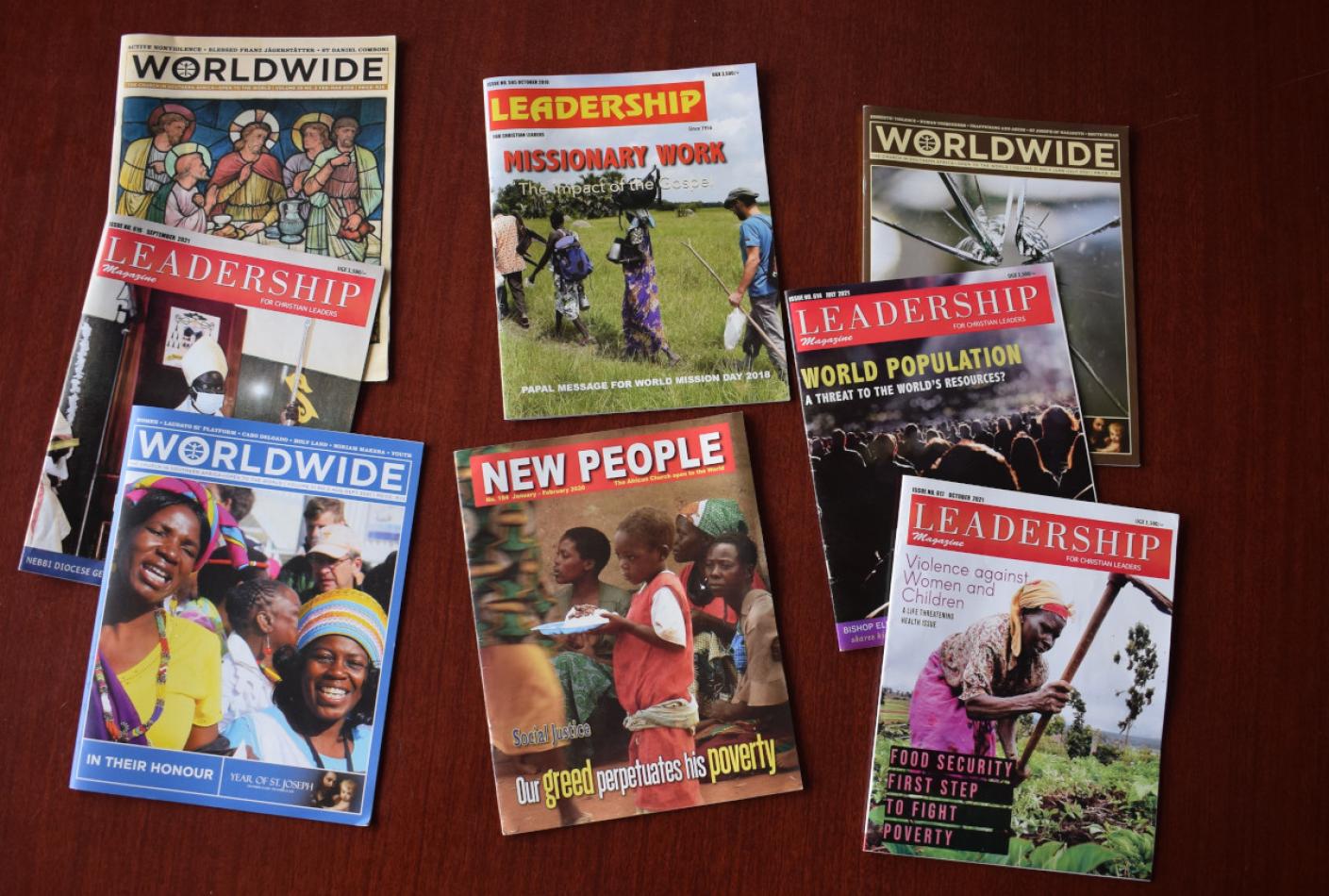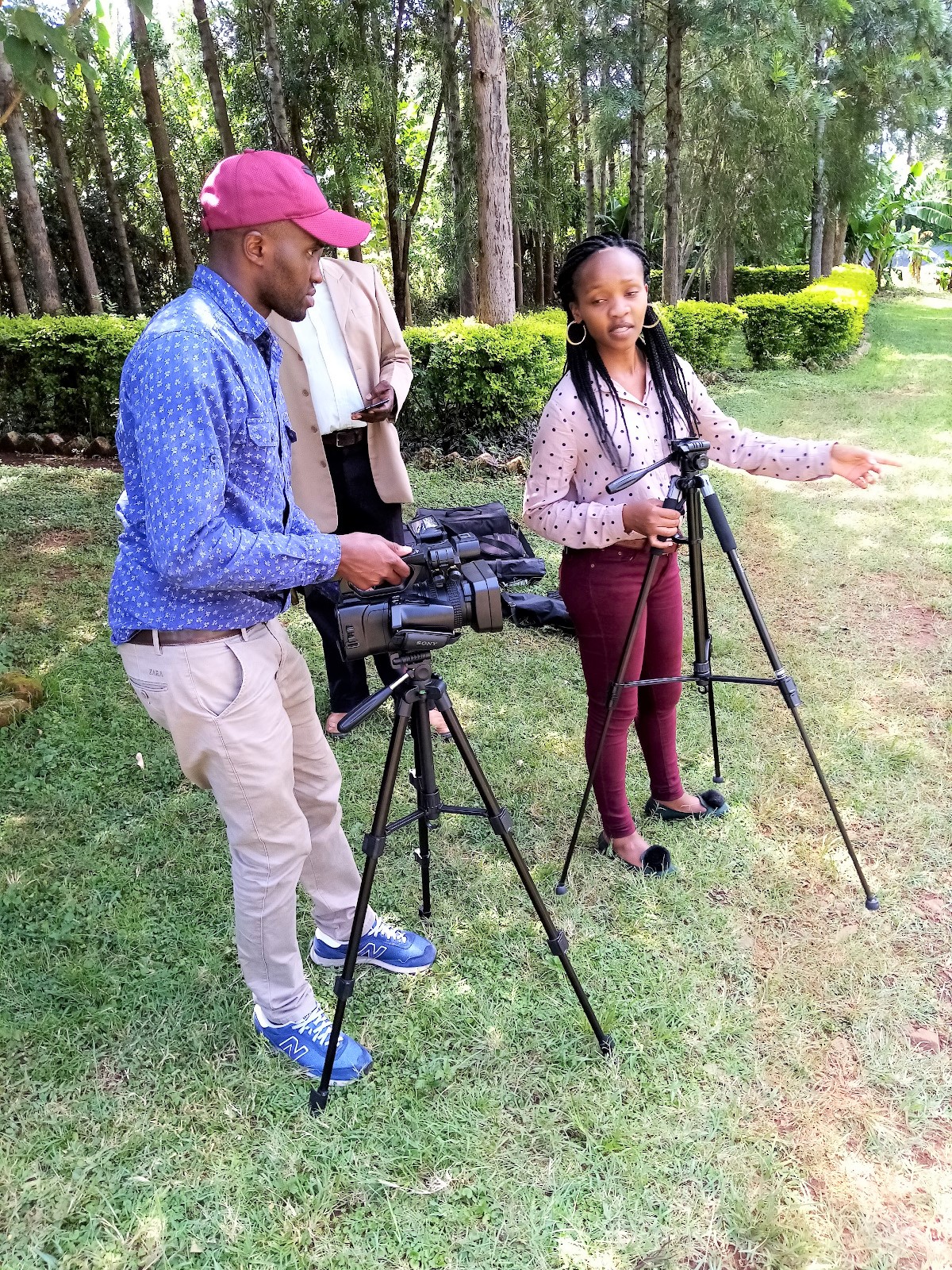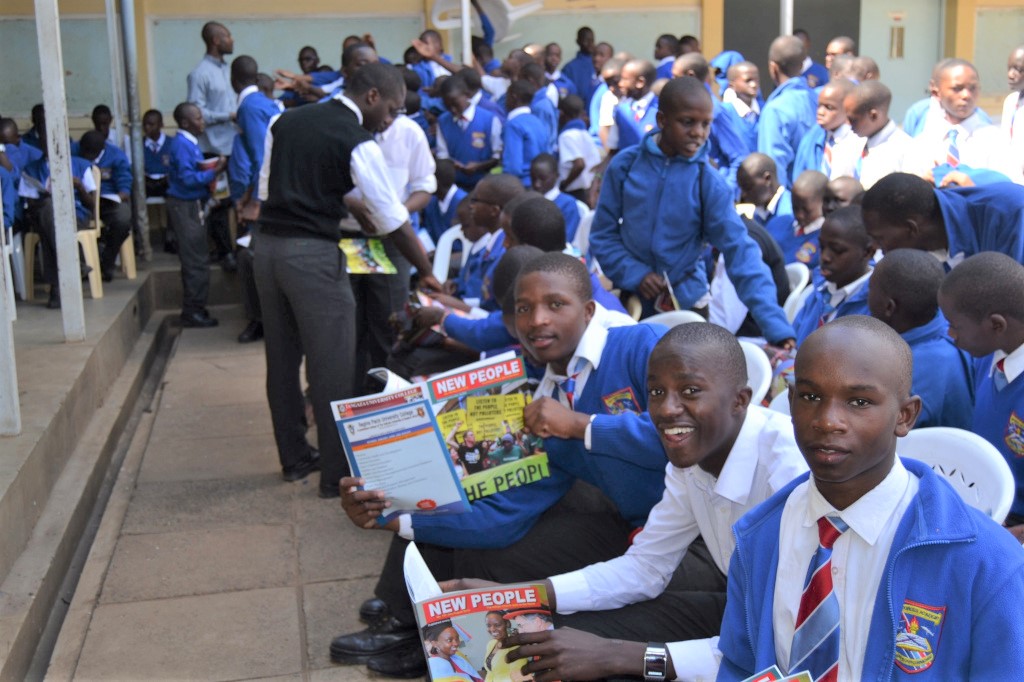Daniel Comboni
Missionnaires Comboniens
Zone institutionnelle
D’autres liens
Newsletter
Thursday, December 9, 2021
Over the years, the Comboni mass media has not only undergone remarkable changes but also expanded. Nigrizia gave birth to other magazines in the institute. In the APDESAM region, we can mention New People (Kenya), Leadership (Uganda), Worldwide (South Africa) and Vida Nova (Mozambique). These publications both in print and digital were born essentially as tools for mission promotion. Today, they champion several other initiatives in the church and society. (Fr. Andrew Bwalya, mccj)
Comboni Media in the APDESAM Region
Successes and Challenges
Comboni wrote hundreds of letters by hand to express his missionary concern for the regeneration of Africa. He used letters as a tool for missionary promotion. Through these letters, he addressed friends, dignitaries in palaces, cathedrals and even the First Vatican Council. In 1872, he launched a missionary magazine La Nigrizia, the first ever missionary magazine in Italy.
In his words, “The father of this great soul planned with me to found a monthly journal that will develop the glory and dignity of Jesus Christ contemplated in his teaching and examples. In this way it will become the journal to inform the public about the work for the regeneration of Africa and the guard of honour of the Sacred Heart”, (Writings, #1510).
We can safely say that Comboni was primarily a missionary promoter. He employed the mass media for this same purpose, that is to raise missionary awareness in the church. Nigrizia is now 149 years old. In 2017, we celebrated the 150th anniversary of the foundation of our institute. This immense history begs for a reflection on the successes and challenges of our Comboni mass media.
Comboni mass media-successes
The 150th anniversary of the foundation of our institute was not only a moment of thanksgiving. It was also a favourable time for innovative thinking in our institute. In the last 150 years and more, society, the church and our institute have changed drastically.
Some of these changes within the institute are the demographics of vocations, dwelling numbers of confreres and the reality of interculturality. In the church, rightly so, the role of the laity has been highlighted and the concept of mission is much broader than before. Society is becoming anti-religion and lays stress on human rights than dignity.
There are also great advancements in the field of new information technologies and social media. This is the reality in which we are called to incarnate our Comboni charism. Changes are still happening and we cannot but change too if we want to make headway.
Over the years, the Comboni mass media has not only undergone remarkable changes but also expanded. Nigrizia gave birth to other magazines in the institute. In the APDESAM region, we can mention New People (Kenya), Leadership (Uganda), Worldwide (South Africa) and Vida Nova (Mozambique). These publications both in print and digital were born essentially as tools for mission promotion. Today, they champion several other initiatives in the church and society.
There are some key successes with these magazines and Comboni media per se. Certainly, one of them is raising missionary awareness in the local churches. Through our publications and media content, we have successfully made our and Comboni’s name known. Importantly, people (readers) in the church and society associate these magazines with missionary content.
Similarly, we have been able to promote missionary vocations. Our magazines carry stories of Comboni missionaries and the work we do. In some cases, we publish vocation stories of our confreres. These stories and witness have touched and inspired some young people to opt for missionary life. Not infrequently, confreres narrate how they first met the Comboni missionaries through reading about them in our magazines.
Another success story of our mass media is the dissemination of the social teachings of the church. Our mass media does not limit itself to missionary promotion. We have been championing issues of humanity rights and dignity as envisioned in the social teaching of the church. We have for instance carried stories aimed at condemning abuse of power by those in leadership positions both in church and society. In some cases, we have spoken about issues of justice and peace, democracy, youth empowerment, family life and education.
In the same vein, our mass media have highlighted issues of good governance and corruption and the need for a far distribution of the goods of the earth. Today, we are also involved in promoting matters around climate change as encouraged by Pope Francis in his encyclical letter Laudato si’.
Our media houses have also contributed to the training of African Journalists. Our doors have been open to students of journalism and communication. We have offered them programs and opportunities for internship. Similarly, they have benefited from our publications in terms of research on topics related to missions and missionaries in the church.
Another success story of our mass media and work in this field has been facilitating the setting up of communication structures in the local church. Some of our confreres have opened radio stations and publications for the local church. Besides, they have also trained media personnel to run these structures.
Internally, our mass media have helped us to raise funds locally through campaigns and advertisements. Our bond of collaboration with other institutes doing ministry through the mass media have been strengthened too. This happens at the level of sharing editorial materials, ideas and celebrating together events such as World Communication Day as church media.
Comboni mass media challenges
Things have not been rosy throughout. Our Comboni mass media has and continued to face serious challenges at different levels. The biggest challenge perhaps is identity crisis. Our identity as missionaries today is rather weak. There is a sense in which parish ministry is becoming the main thing for us Comboni missionaries at the expense of mission promotion through the mass media.
Regrettably, mission promotion is an area in which we are losing very fast and yet it should be in our DNA. Apparently, we do not believe anymore in mission promotion through the mass media. Our communities are full of Comboni magazines that have been printed but still neatly packed awaiting distribution. Lack of conviction in mass media apostolate could explain this unfortunate situation.
It is increasingly becoming difficult to distinguish between parishes run by diocesans and those by Comboni missionaries. We seem to be doing the same things as diocesans. Therefore, our focus, I think should be on mission promotion. Comboni was primarily a mission promoter. He had mission promotion as the main activity in his writings, plans and the eight missionary journeys he did. That is what we are losing today.
“However, finding myself alone, without the help and financial means necessary to implement my plan, but with the permission of my superiors, of His Eminence Cardinal Barnabo, Prefect of Propaganda and Rev. Nicola Mazza, for three years I was obliged to run around Italy, France, Spain, England and Germany and especially Austria, in a continuous attempt to study foreign missions and their institutions which are admirably organized in France and Ireland. Everywhere I sought to build up my knowledge, and giving a clear explanation of the importance of the work to be undertaken, to procure support and money for myself” (W4800).
Furthermore, “The church on earth is by its very nature missionary since, according to the plan of the Father, it has its origin in the mission of the Son and of the Holy Spirit” (AD, #2). Our mass media and today social media offers us the possibility of carrying out this mission efficiently and adequately.
The crisis of missionary identity which leads to a weak and poor missionary promotion strategy has contributed to the dropping of subscriptions to our magazines. The reduced number of subscribers is a challenge that has far reaching consequences. The obvious one is that we are unable to pass our missionary message to many people as implied in the concept of mass media. Furthermore, having few subscribers is financially burdensome. Ideally, production costs are met by subscriptions made which also attracts advertisers.
A poor reading culture is another challenge that our mass media faces today. Contemporary human beings seem to be poor readers. This has been precipitated in part by the proliferation of social media that conveys messages chiefly in audio and video format. Our mass media on the other hand has been predominantly print which envisions written text.
Equally, there is a lack of depth in social media content. Even as we try to adapt our media houses to the digital space, we immediately see that the nature and dynamics of social media does not accommodate deeper analysis of topics. Social media consumers do not entertain long pieces of writing that print media cherishes. The social media audience’s concentration level is short hence shallow messages and sensational headlines.
The shift from analogue to digital media has had financial challenges. Our media houses had to acquire new equipment fit for the digital space and operation. This often meant discarding old analogue equipment such as cameras and studios at a very high cost. It also meant training of personnel able to operate in the digital space.
Few trained personnel. Our media houses have been run largely by self-taught and passionate confreres in the field of mass media. The trained ones have for all sorts of reasons have either chosen not to practice their trade in the Comboni media or they have left the institute. In the long run, this created the challenge of succession. We have often found ourselves hunting for qualified personnel to take over the management of magazines but in vain. Hence, we ended up recycling personnel.
Another challenge area where we should be focusing on is collaboration with the lay people. It is a fact that our numbers in terms of personnel are not likely to grow very big. The opposite is true. We are getting fewer and fewer. Our communities in the north for instance are filled with old and sick confreres. This poses a challenge for the running of our media houses since some of the old and sick confreres had talents for media apostolate.
On the other hand, we have today many and well trained lay people who can collaborate with us in this field. Now more than ever before, we understand that every baptized Christian, whatever their state of life, is to be regarded as a missionary. This is spelled out in Lumen Gentium: Every disciple of Christ has the obligation to spread the faith to the best of his or her ability (LG 17).
Our challenge here is how to appreciate and appropriate the contribution of the laity in our mission. Due to clericalism most of us still treat lay people as helpers in the mission instead of as equal partners. In many instances, we are even afraid to collaborate with educated lay people and prefer to work with those we can manipulate. This is simply shooting ourselves in the foot. Against the backdrop of our dwelling numbers, it would be wise to tap into the potential of the laity around us. This would guarantee the continuity of our missions since we would have shared the charism with capable stakeholders.
The other challenge and focus area today for us should be in the field of advocacy through the mass media and social media. Society and the church expects it from us. “Advocacy is an activity by an individual or group whose aim is to influence decisions within political, economic, and social systems and institutions”.
Advocacy through the media demands a new type of formation. It means being abreast of what is going on in the secular world and challenging it with gospel values. Put differently, it means identifying the needs of today and giving answers. There are many causes today that we can pick and focus on such as street kids, human trafficking, tribalism, corruption, climate change and many more.
Additionally, ministry in the area of advocacy through the mass media and social media, will require specialized training but also a deep spirituality rooted in the word of God. Our relationship with God’s word is key. It is irreplaceable. Our success as Combonis of today will depend very much on how much we embrace and meditate on God’s word.
Pope Francis reminds us that “All evangelization is based on the Word, listened to, meditated upon, lived, celebrated and witnessed to. The sacred Scriptures are the very source of evangelization. God’s Word nourishes and inwardly strengthens Christians, enabling them to offer an authentic witness to the Gospel in daily life.” (Pope Francis, Joy of the Gospel, 174).
Our challenge here is that some of us have become more of activists than missionaries inspired by God’s word. We are comfortable to identify with activists and NGOs that are more socially oriented than a spiritually oriented mission. Yet true advocacy for us is one that is inspired by the beatitudes and not just human rights as defined by the UN.
Lastly, we have the challenge of management and continuity of structures established by our ancestors. The issue here is that of self-sustainability and reliance. Most of the younger Comboni generation have inherited buildings, programs and ministries which were started and heavily funded by resources from the north. Our media houses share the same story.
Since many confreres from the north are now old or have died, the funding that went into these projects has radically gone down or simply stopped. Local people as beneficiaries often were not empowered to support the mission. On the contrary, they have grown up to believe that missionaries have to give them handouts. This reality in diocesan run structures is changing so fast and not so in our Comboni institutions and projects.
Conclusion
Despite all these challenges we still have a bright future with our media houses in the APDESAM region. What we need is a fresh belief in this apostolate. Consequently, invest in the training of confreres to work in this field. Comboni was a prolific writer and a missionary promoter. Today, unlike in Comboni’s time, advances in information and communication technologies have unleashed enormous opportunities for missionary promotion. We cannot but grab these opportunities.
Fr. Andrew Bwalya, mccj.






